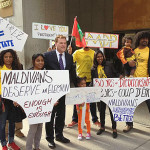Decentralisation is one of the biggest issues facing the Maldives, a group of NGOs said yesterday at a meeting intended to inform the public on the subject.
Transparency Maldives, Democracy house, Rights for All, Madulu, Maldivian Detainee Network, Strength of Society and the Hodehdhoo Association for Development gave out information on decentralisation, an issue which last month caused gridlocks inside parliament and protests outside.
During the last term of parliament, President Nasheed presented a bill to decentralising the Maldives and divide up the islands into seven provinces, as stated in the manifesto of MDP.
Opposition DRP MPs stalled the bill with ammendments leading to quarrelling in the final sessions and several protests. The DRP claimed dividing the Maldives into provinces would affect the provision of services to people, while the MDP claimed it would make it easier.
President Nasheed withdrew the bill due to the heated dispute between MPs, with the intention of returning it later.
DRP MP Ahmed Mahloof said that dividing the Maldives into seven provinces was “illegal”.
Mahloof claimed only 15 per cent of the population would vote for decentralisation if President Nasheed put it to a referendum.
”We asked them to take a vote among the people, and I know they are afraid,” said Mahloof.
Meanwhile, MDP MP Ahmed Easa claimed according to the law Nasheed is compelled to divide the Maldives into provinces because it was in the MDP’s manifesto.
”We believe that people voted for MDP because they want to have what is in our manifesto, so we do not need to be taking another vote on this which will cost more than Rf50 million to undertake,” said Easa.
He claimed that dividing the islands into provinces would bring facilities closer to people.
”For instance, is it easier to come Male’ to get a service provided by the housing ministry or to get that service from the nearby island?” Easa asked.
The bill will return to parliament when it resumes in March.






This is funny. There was a lot discussed in the meeting and non of it is mentioned in this news article.
Other than that "Decentralization is one of the biggest issues facing the Maldive" and i don't think that was even said in the meeting.
this is horrendous reporting! there was a lot of practical and academic discussion during the meeting. and none of it is mentioned here. and the NGOs had even faxed a written news article to minivannews on the event, outlining points of discussion. none of that is provided here!
The whole concept of decentralization is wrong and flies out of window in the face of economic arguments for the already adverse condition of dis-economies of scale. Centralization is a fools idea.
Whatever the progress achieved in Male (high real estate) is due to centralization which is a positive thing. There are of-course social issues due to poor planning and not due to centralization. Unfortunately, these two issues are purposely confused by politicians.
What is need is MORE centralization and not less.
The real issue here is good planning to alleviate the social problems due to centralization - principally due to lack of space.
Its time to talk about a bridge or a good ferry service to Hulhumale.. not economically stupid ideas like urban centers..
This is why people say Minivannews is the new Governments Mouth Piece 😛
When our forefathers made the constitution, they intended to decentralize the local governance of island and atoll, not the Executive branch of the State, in another words municipal affair.
It was well intended to replace Island Development Committees and Atoll Development Committees with well structured Island or Atoll Councils with clear legal mandate to administer local or municipal affairs of the islands and atolls.
The Constitution also empowers the all the Executive functions of the State to the President. It is up to the President to establish his own administration, the composition and even the style of the administration.
There should be no doubt about whether the President has executive power and authority to create seven province departments within the Home Ministry in the capital Male’ or for that matter in seven different regions of the country.
Decentralization of local or municipal affairs and devolution of the Executive power are totally two different concepts. Please do not mix these two levels of governance.